

Tao Te Ching
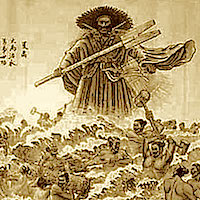
Xia Dynasty 夏 (2100 – 1600 BCE)
Xia Dynasty 夏朝 (2070-1600 BCE)
The first Chinese dynasty traced back to the the legendary Three Sovereigns and Five Emperors and said to have been founded by Yu, the last of these Five Emperors; the Xia Dynasty only occupied a tiny percentage of modern China’s land (the area surrounding Zhengzhou in Henan province). This was a time period that ended 300 years before China’s first writing system so much of this history is clouded in superstition and legend. Historical agreement though posits the unification of these tribes being based on a successful effort to control the Yellow River by building an extensive system of canals. This dramatically increased agricultural production and gave the Xia a strong economic base for conquering and controlling more territory. Modern Han Chinese trace their origin back to these Huaxia, late neolithic and early Bronze-Age tribes that lived in this area.
Sages (5)
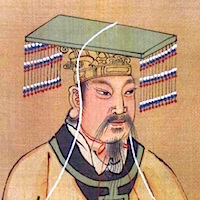
Cheng Tang 成湯 (Tang of Shang)
1675 – 1646 BCE
Tang Dynasty founder and example of just leadership
Founder and first king of the Tang Dynasty, Cheng Tang lowered taxes, decreased the military conscription rate, and after a long drought when parents had to sell their children, he distributed special gold coins to poor families so they could buy their children back. Claiming the Mandate of Heaven because of King Jie’s depravity, he overthrew the Xia Dynasty and united over 40 smaller kingdoms which almost doubled Chinese territory.
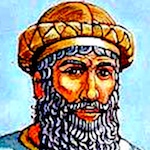
Hammurabi
c. 1810 - 1750 BCE
Father to his people and example of good government to us all
In a primitive time and place of barbaric chaos, Hammurabi not only established order, prosperity, and fairness for his own country but set an example and structure for governments of his time, throughout history and all the way to modern times. He used wisdom and irrigation to make Babylon one of the richest cities history had known and then used his power to become “a real father to his people” giving them justice, infrastructure, a higher culture, and a legal system that prevented abuse of power, oppression of the weak by the strong, marital tyranny, protection of orphans and widows, and laws we still use today like “innocent until proven guilty.”
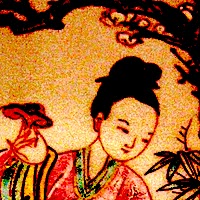
Queen Mother of the West 瑤池金母 (Wang Mu, Niang Niang)
1766 – 1666 BCE
Feminine principle embodiment
Symbol of matriarchal preeminence, feminist role model, Taoist goddess of fertility and life, embodiment of Yin femininity, bringer of longevity, prosperity, and bliss; Wang Mu refused to submissively bow down to male superiority and disdained the typical Chinese attitude of always wanting male children, being disappointed with female births. Mythologized throughout Asia, she became an inspiration for women in China, Viet Nam, and Korea who had trouble passively following in the expected patriarchal role models. Although sited in accounts more than 1000 years before Lao Tzu’s time, she became one of the most popular symbols in Taoist tradition and—in at least one account—inspired and ultimately wrote with him the Tao Te Ching. Her influence and popularity continue today in many parts of the world and she is venerated in the Taoist Shangqing School.
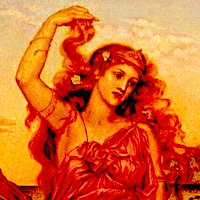
Semele Σεμέλη
c. 2000 -1970 BCE
Early Greek Virgin Mary
Early prototype for the Virgin Mary, “earth mother,” daughter of Cadmus, the first Greek hero, founder and first king of Thebes; Semele gave birth to the early Jesus-figure, Dionysus who was born on December 25th, changed water into wine, was the son of god and a mortal woman, died and resurrected after 3 days. Worshipped by the Athenians, in Roman mythology, she became the goddess Stimula, in Neoplatonic philosophy she personified “intellectual imagination,” and during the Enlightenment became a popular theme for operas. Incinerated because of seeing too deeply into the nature of a god, she represents the Icarus-principle of hazards from too much of a good thing.
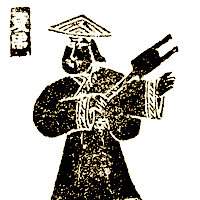
Yu the Great 大禹
c. 2200–2100 BCE
Leader of the Five Water Immortals
Philosopher-king, prototype ruler of ancient China, Taoist water deity, and leader of the Five Water Immortals; Yu became famous for introducing flood control, establishing dynastic rule, and for his impeccable integrity. One of the few Chinese rulers to be given “The Great” title, he is often seen in statues carrying an ancient hoe. Imperial emperors including Qin Shi Huang often traveled to his shrine to perform rituals.
Quotes (2 Quotes)

“As India is par excellence the land of metaphysics and religion, China is by like preeminence the home of humanistic, or non-theological philosophy.”
Comments: Click to comment

“Morality, art, spirituality, and creativity are universal human abilities embedded in our DNA. Their genesis was in Stone Age Africa. It is therefore crass egotism to ascribe to them a more recent place and time, be it China in the age of the Yellow Emperor, Greece in the age of Plato, or Arabia in the age of Muhammad.”
Comments: Click to comment
Chinese Eras
Xia Dynasty 夏 (2100 – 1600 BCE)
Shang Dynasty 殷代 (1600 – 1046 BCE)
Western Zhou 西周 (1046 – 771 BCE)
Eastern Zhou 東周 (770 – 256 BCE)
Spring and Autumn period 春秋时代 (770 – 476 BCE)
Warring States period 春秋时代 (476 – 221 BCE)
Qin Dynasty 秦朝 (221 – 206 BCE)
Three Kingdoms 三國時代 (220 – 280 CE)
Southern and Northern 南北朝 (420 – 589 CE)
Tang Dynasty 唐朝 (618 – 907 CE)
5 Dynasties 10 Kingdoms (907 – 960 CE)
5 Kingdom of Dali 大理国 (937 – 1253 CE)
Western Xia 西夏 (1038 – 1227 CE)
Southern Song (1127 – 1279 CE)
Comments (0)